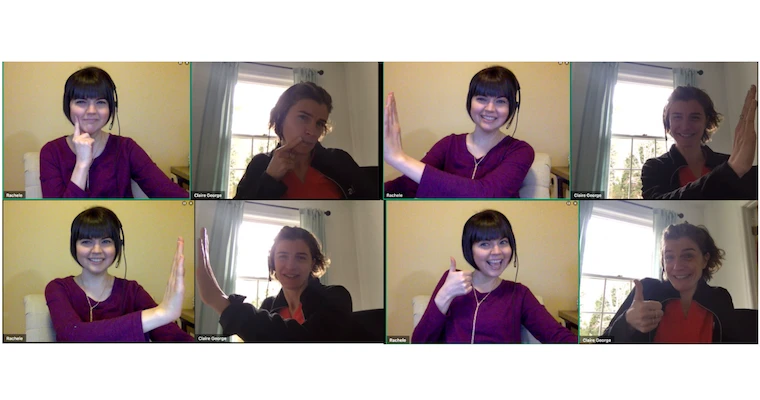
What every remote worker should do within the first 30 days
Your first day on a remote team. We wrote about this topic a couple of years ago and I recently started rethinking why we focused on just one day. Not because the advice is no longer valid. But because I heard an Aha! teammate share how much they learned in the first year at a remote company.
Yes, your first day at a remote job matters — but even more meaningful is what you do in the first 30 days. Your first month sets you up for success.
The fact that the first 30 days means so much to individuals and the team never surprises me. And this is why we work so hard to make sure people get off to a great start. It starts with a comprehensive onboarding process for each person who joins our team and the coach that is assigned to work with them.
As soon as the person accepts our job offer, we send out a welcome package with a computer, some Aha! swag, and a few books that our team has read and enjoyed. On day one, there is a video meeting with their onboarding coach — who kicks off a four-to-eight-week program (depending on the role) that takes a detailed walk through our product, customer, values, and culture.
We make this comprehensive onboarding a top priority in the first few weeks because we want to invest in our new teammate’s success. (And with that, the future of our team as a whole.) So, we give our all. And we expect them to give a lot back. This means taking the work seriously and setting themselves up for success too.
If you are joining a remote company, you might wonder how you can lay the foundation for your own success. I believe this starts with having a clear action plan. To help you create yours, I thought I would share more about what we think people should learn in the first 30 days — and beyond into the first 6 months and year:
30 days
Learn the company vision — What are the company’s values and plans for the future? I hold a kick-off session with new Aha! teammates and deliver a presentation that talks about our history and where we are headed.
Join weekly meetings — Make sure you have a 1:1 set up with your manager and start joining regular team meetings to get a sense of how things work. We get these meetings on the calendar before the new teammate even begins, so they know where to be and when as soon as they start.
Introduce yourself broadly — Hop on video calls with teammates and reach out to at least one member of each cross-functional team.
Connect with locals — Is there a teammate who lives near you? See if you can set up a time to meet and work together.
Set up your space — Understand where you work best and create your own “office” area.
Research everything — During our onboarding program, teammates learn every aspect of our products, eventually giving a live product demo to a prospective customer. But if your company does not offer this kind of formal education, you can still create your own. Take time to read everything you can about your new company, customers, etc.
6 months
Set meaningful goals — By now you are making meaningful contributions to the team. You have probably completed at least a few projects that are impactful. Now that you have a solid sense of your role and the work, what do you want to accomplish? This could be an area where you can improve personally or help the company grow. Jot it down.
Identify roadblocks — After setting those goals, are there areas you know right away you will need help with? Your manager does not always have insight into the struggles you are dealing with since you are not physically in the same office. Speak up and start an open conversation.
Understand communication styles — By now you should understand how the team you work with prefers to communicate (instant message, video chat, email). If you are unclear, be sure to ask before kicking off any projects. It will make collaboration go much smoother.
Schedule virtual meetups — Make time for regular interactions with your teammates by scheduling times to meet, even if it is just for a casual 10-minute chat. At Aha!, you can opt into a monthly program that randomly pairs you with another teammate for a video meeting to chat about whatever you like.
Keep learning — Onboarding is not over. After teammates complete our official program, we encourage them to continually develop skills and build knowledge. One way we do this is through educational training sessions that we hold throughout the year — some focus on a specific area while others explore broader skills like value exchange.
1 year
Look back — Did you accomplish the goals that you set and were set for you? What are you most proud of? Many times we forget our major accomplishments as time passes. It helps to write down what you achieved from the past year. You will want to refer back to your notes when it is time for a formal annual check-in with your manager (like we do at Aha!).
Look ahead — What do you want to accomplish in the next 12 months? Now is a good time to discuss what went well and what you could do better. Aha! managers work with each teammate to come up with three-to-five specific and measurable goals. These goals form a contribution plan for the next year. We always like to include a stretch goal too — something to reach for and strive against.
Pay it forward — As new folks join, reach out and welcome them to the team. Remember how it felt when you were a new hire. If you have suggestions on how the company can improve that first-day, first-week, and even first-month experience, share what you now know.
Hitting the first year at a new job is a huge milestone, but your success often depends on how you start.
Ideally, you are joining a company that is just as invested in your growth as you are in growing. But even if you do not have a strong support system, you can still take steps to make that first year a success.
So, check in on yourself — 30 days, six months, and one year in. Make sure that you are continually growing in your skills and as a teammate. The goal is to reach your first work anniversary and be amazed by how far you have come.
What else should people focus on when they start a remote job?
Our team is happy, productive, and hiring — join us!




